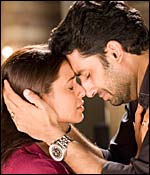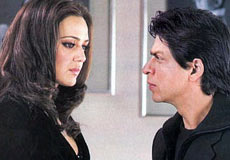Contribute
| Youth Speak: Bollywood Drama Redefined |
Simran Thadani
08/20/2006
Kabhi Alvida Naa Kehna
-- Simran Thadani
The diaspora is abuzz, as is The New York Times, the Indian media, and my dad. Once again, a big-budget multi-starrer replete with catchy tunes and foreign shooting locations has hit the marquee … Expectations are high. Ticket sales are record-breaking, as was the film’s budget. Both the die-hard and the cynical were curious to dig into Karan Johar’s first film in three years.
If nothing else, Kabhi Alvida Naa Kehna at least provides food for thought (at 3 hours and 10 minutes long, there’s plenty to chew on!) But unfortunately, what points the film wins for style, class, and production values are frittered away due to significant weakness in substance.
To style, first, to give praise where it is due: the film is, in a word, masterfully executed. Johar and his crew exhibit commendable control, dressing hundreds of extras in colour-coordinated outfits, deftly capturing the spirit and skyline of a great metropolis, selecting and decorating apartments, mansions, offices, wedding venues et al with the utmost care. For anyone who might doubt that a love of vibrant colour and extravagance is ingrained in the Indian imagination, this film alone is enough evidence to the contrary.
The slick directorial style that Nikhil Advani used to great effect in Kal Ho Naa Ho (2004) is also encored here, to great effect. The quick pullback cuts (such as in the Grand Central Station scenes), the way the actors somehow stand out even among a profusion of extras, the glory of the Brooklyn Bridge and Central Park as seen from low angles… Many raved about KHNH that New York had never looked so beautiful – but I say KANK wins that contest. In terms of song picturizations, Johar more than satisfies every kind of viewer (just as Shankar-Ehsaan-Loy try to satisfy every kind of musical taste) with the heady rock/rave style of “Where’s the Party Toniteâ€, the maudlin blowing leaves of the title song, the mega-production of “Rock N Roll Soniye†(à la “Mahi Ve†from KHNH)…
Javed Akhtar and Niranjan Iyengar (lyrics and dialogues) have a great command over the language. Of course, sometimes words are unnecessary in a visual medium. The camera lingers silently for just a second on Abhishek Bachchan’s boyish face, towards the end when he shows up in Philadelphia; on the perpetually-makeup-embellished Rani Mukerji as her unsuspecting blindfolded prank turns out to be an embarrassing peepshow; on Kirron Kher and Abhishek Bachchan as they discover a major indiscretion – and so much is said without any words needed.
But the problem is that so much more is said… and said literally. The plot is simple, and encapsulated in the publicity line about a love that breaks all boundaries. Yet it somehow still merits a lot of explaining – perhaps too much so.
The doomed love affair between Dev (Shah Rukh Khan) and Maya (Rani Mukerji) is set up even before the David-Beckham-esque footballer suffers an unfortunate accident and turns bitter, even before the radiant bride has attended her own wedding and realized her mistake… Even before we really learn everyone’s idiosyncrasies past the light-hearted humour of the first half-hour. All we know is that SRK has warned Rani never to say goodbye. The rest, for anyone who cares to think ahead, is a self-fulfilling prophecy. Dev’s trailblazing wife Rhea (Preity Zinta) and Maya’s devoted but frustrated husband Rishi (Abhishek Bachchan) can stand no chance against this love.
But of course, this is a Hindi film, and reportedly the most expensive one ever made – so it has to play every last one of its “hit formula†cards, dragging the process out endlessly. Whether this dilatory treatment is an attempt to keep the audience guessing or a way to make sure they get their money’s worth is moot. The plot twists and turns and twists again, the characters jump between the East and West sides of New York City, and it rains and shines in accordance with their moods, before things finally come to a head between the married couples.
The real climaxes of the film, to me, are the points at which Dev’s and Maya’s spouses have had enough of their deficiencies. Abhishek Bachchan is spectacular and entirely believable in his restrained violence and frustration towards his frigid wife; Preity Zinta sparkles and flashes as the uncompromising woman who fiercely refuses to work on her failed relationship unless her apathetic husband does so too. Divorce and more tears seem imminent… But wait, there’s another hour-and-a-half to go – and you just know that the film does not belong to Rhea and Rishi, but instead to Dev and Maya, the lovers, the cheaters, the winners despite their losses.
It’d be anyone’s guess how a sordid theme like marital infidelity – not part of that same “Indian culture†– would translate to the silver screen, especially in the hands of a modernist like Karan Johar, who has spoken against the very institution of marriage. Much as we would like to believe otherwise, the South Asian consciousness is overall still traditional, family-friendly. Shah Rukh Khan himself has declared an aversion to on-screen kisses; how, then, would desi audiences react to their screen idols talking about sex and committing adultery? These themes no doubt had to be dealt with very slowly and carefully. Pre-release, the film drew comparisons to the English film Closer (2004) – but there is no brazenness in KANK, no sex-kitten Natalie Portman, none of the swinging that is now such a blasé topic in American pop culture. I suspect that that’s part of the reason the film unravels slowly – picking apart the question of extramarital relationships is not as quick and dirty a job as Dev and Maya’s affair.
The problem is that the slow unraveling of the plot is just one of two major strikes against the film. The total discounting of realism is the other. I have watched 3-hour films all my life, but even I had to admit this one was just too drawn-out, melodramatic and overdone for my taste. I will concede, of course, that the film at least dares to enter the unusual territory of the non-happily-ever-after and is thus more real than most other sugar-coated Bollywood productions. Yet even grave themes like unhappy marriages, infidelity, infertility, and divorce cannot be taken seriously when confronted with timely songs, cooperative parents-in-law who say and do all the right things, guest appearances, too-perfect backdrops, Amitabh Bachchan, Abhishek Bachchan, and of course the King Khan, with his furious eyebrows, over exaggerated limp and baffling attractiveness to the goodie-goodie Maya.
This is a Hindi film. These are not real people. These are not real fates. Such mothers- and fathers-in-law – the kind who condone and advise leaving their offspring – are, to the best of my knowledge, still the stuff of myths. And (I hope, at least, that) those are not real sunglasses that both ABs wear at various points. Perhaps those various endings (I mean the multiple points in the film at which I thought, “OK, this makes sense, now it’s going to end…â€) were real, but unfortunately the last one, the final one before the credits, was not real. When Rhea says to Maya that she will only know real punishment after she’s lived with Dev, that’s a real-life warning from a hurt divorcée, not an excuse to run in a sari and high heels to Grand Central Station in less than 14 minutes!
The verdict, however, all said and done, is that KANK is meant to be entertainment, not profound social commentary. It does what it can – but it has to do so in small steps, because it is a Hindi film, and its goal is a humble one: box office success. And if that success is won due to the lure of a 3-hour escape from reality in addition to the strength and pull of its star cast, then why begrudge Johar his laurels? After all, who would give up the chance to watch the fictional (all desi, all gorgeous) hoity-toity of New York City disentangle themselves from a complex and hurtful web of deceit? Beware, filmgoers – Kabhi Alvida Naa Kehna is not all song and dance, it also involves a heavier-than-normal dose of glycerine. Not your average Bollywood drama… But in a strange way, just what you would expect.
You may also access this article through our web-site http://www.lokvani.com/

